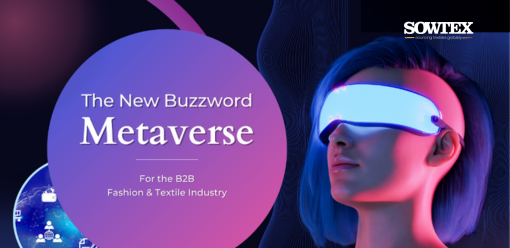


Introduction
In recent years, technological advancements have introduced a new buzzword: “Metaverse”.
While hailed as the next big innovation, it has also faced criticism for being
overhyped and overpromised—especially in the context of the B2B fashion and
textile industry. This raises questions about its true potential and what the
metaverse really entails.
What is
the Metaverse?
The metaverse is essentially a virtual-reality space that simulates real or
imagined environments. Users interact with these environments and others as if
physically present, using digital representations called avatars. Simply
put, the metaverse is an immersive digital realm, often experienced through
virtual or augmented reality.
The
Importance of Avatars
In today’s world, we navigate between two realities: physical and digital.
While we seamlessly transition between them, they often feel disconnected. The
metaverse bridges this gap. For instance, in the real world, someone might work
and socialize as themselves, but when they enter the metaverse, they embody
their digital avatar. These avatars allow individuals to express their
personalities in unique and creative ways, enhancing their digital presence.
The Shift
from Physical to Virtual Spaces
The move toward virtual spaces has been accelerated by global events like the
pandemic, where digital communication tools like Zoom and Webex became
essential. The metaverse takes this a step further by enabling Experiential
Conferencing Environments through VR.
In the
B2B fashion sector, events like the Metaverse Fashion Week in Decentraland
(March 2022) highlight the industry’s willingness to embrace this technology.
Virtual environments are poised to transform how businesses collaborate,
showcase products, and conduct transactions.
Metaverse
as a Game-Changer in Marketing and Forecasting
The B2B fashion and textile industry can leverage the metaverse as a powerful
tool for marketing and trend forecasting. Consider this: over three million
people engage daily with video games, collectively spending $100 billion
annually on virtual goods and skins.
Fashion
brands are tapping into this trend by offering digital collections that appeal
to tech-savvy customers. Luxury brands like Ralph Lauren, Gucci, and Burberry
are already creating virtual products to enhance their brand image in the
metaverse.
Experiential
Commerce Stores and NFTs
Disruptive platforms like Trace Network Labs are taking the metaverse
further by introducing Experiential Commerce Stores. These stores allow
B2B fashion manufacturers and brands to showcase their inventory as NFTs.
Buyers, represented by avatars, can explore these stores, try on items, and
make purchases.
Products
offered in these stores can be:
As Sunil
Arora, Co-founder of Trace Network Labs, explains, this concept merges the
convenience of e-commerce with the immersive experience of physical shopping.
Augmented
Forecasting for Smarter Decisions
The metaverse also introduces the concept of Augmented Forecasting. By
analyzing real-time interaction data from virtual stores, businesses can
predict future trends with greater accuracy. Combining this data with
traditional forecasting methods reduces waste and improves inventory efficiency
while boosting sales.
The
Metaverse’s Potential for B2B Fashion
The metaverse could revolutionize the B2B fashion and textile industry in three
key phases, each impacting technology, market dynamics, and product
development. Key benefits include:
Accessibility-Virtual apparel makes high-end
fashion more universally available.
Experimentation- Brands can innovate freely with styles, colors, and
fabrics.
Sustainability -Virtual fashion reduces waste, mitigates overproduction,
and limits environmental impact.
Conclusion
While the metaverse currently appeals to a niche audience, its growth potential
is undeniable. As the technology evolves, it will redefine how businesses in
the fashion and textile industry operate, making virtual fashion as significant
as its physical counterpart. The future is phygital, and the metaverse is
leading the way.
Visit the link:https://sowtex.com
